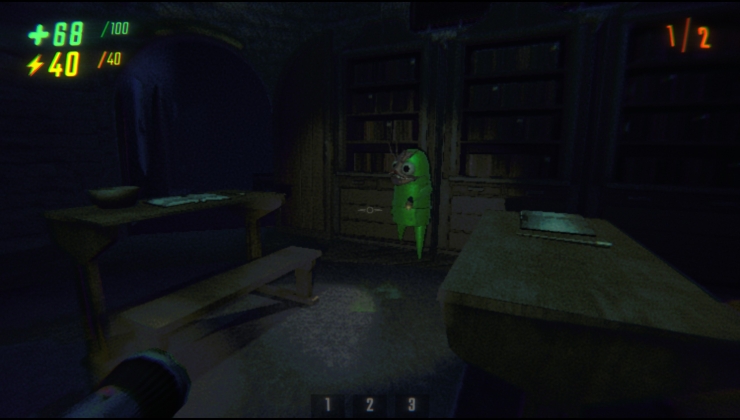With 2025 looking potentially like the year of SteamOS Linux with it coming to more handhelds, perhaps we might finally see a solution to the anti-cheat problem that has plagued the Steam Deck and desktop Linux for so long.
Thanks to the news recently of the GPD WIN 4 planning to have SteamOS support (which turned out to be false from GPD - but clearly they want to do it), and the leaked Lenovo Legion Go S that seems to have a SteamOS version and perhaps some new form of Steam Machine (along with a possible Steam Controller 2) - there's a lot to be excited about right now.
Backing up for just a moment though, because I've seen confusion on this still across Reddit and other social media platforms, the popular solutions Easy Anti-Cheat and BattlEye do support Linux platforms. However, not for the kernel-level side of it, since that's designed for Windows. There's also others that don't support Linux platforms at all like Vanguard from Riot Games.
Sadly, with the user share of SteamOS / Linux still only being around 2%, it gives game developers an easy-out for not enabling their anti-cheat to work on Linux platforms, or looking into ways to make them more secure. Why would bigger developers invest in the support, if the user numbers just aren't there? They won't as summed up clearly by Epic's own Tim Sweeney when previously mentioning Fortnite wouldn't see support until there's "tens of millions of users" because then "it would actually make sense to support it".
We've seen games like GTA Online, Apex Legends, Roblox, Rust and numerous titles from EA completely block Linux-based platforms rather than look into securing them further for the currently smaller market. Many smaller developers and publishers also still refuse to enable their anti-cheat for Linux platforms.
At least we had Marvel Rivals recently issue a statement to reverse bans and reiterate their support of compatibility layers like Valve's Proton to run Windows games on Linux systems.
You'll see comments here and elsewhere arguing to the effect of: "But they say Linux doesn't have many players, and yet there's a lot of cheating on Linux! They can't both be true!". This misses the point entirely. The reason usually being: cheat makers directly end up doing their cheats on Linux, because the protection levels right now are lower. The problem is that even a small amount of cheaters can cause big problems for the wider player-base. Just think, it really only takes one cheater to ruin an entire game and it all adds up. Disabling support for Linux is easy low-hanging fruit in the fight against cheaters.
This creates a loop: not enough players to be worth supporting, so more people stick with Windows on their handhelds and PCs to play the games, and so the loop continues. If we see a steady increase in the amount of devices running SteamOS (and desktop Linux too), it will become a market that cannot be ignored, but only once it's big enough.
I see a lot of people practically begging Valve to release a general SteamOS download, since the Steam Deck has shown just how good Linux can be. But would that actually make enough people switch? I actually highly doubt that. Operating system switching would still be a relatively minor percentage of people overall. I've long said that just having a decent version of Linux available and marketing don't matter enough — it needs to be pre-installed on hardware you purchase. It's really as simple as that.
And this, seems to be slowly what's beginning to happen now which is what's giving me hope that a solution to the anti-cheat problem will be found. It's my number 1 desire for 2025.
I'm not here to offer up any solutions though, since it will require minds about 1000x smarter than mine. But Linux systems (Steam Deck, desktop Linux, other handhelds with SteamOS), will require some kind of secure environment that developers can be assured nothing has been tampered with. It's why they all love Windows kernel-level stuff so much, even though the security of that is rather debatable with the rampant cheating in plenty of Windows games anyway. But again, if the market grows, they would end up having to deal with it or losing out.
This is something that's going to require a little patience from gamers.
So here's to 2025, potentially the year we see more games having their anti-cheat in someway compatible. You can keep up with anti-cheat compatibility on our dedicated page that's gradually being expanded.
For people who do want to try something similar to SteamOS right now, I constantly hear good things about Bazzite.
Quoting: SarmadKernel level anti-cheat is just a silly idea, and it's not bullet proof even on Windows. The only way for it to be really solid is if the user has no root access to the system, which by design isn't the case in PC regardless of OS. Real anti-cheat should be server based, and should depend on a combination of AI + game recordings + community reporting + human reviews. That's the way to do real anti-cheat systems; anything sitting on the user's computer is breakable.Unfortunately, doing it the right way costs more money than user anti-cheat on people's computers, so companies will continue doing the latter and blaming left and right when they see fit.
If that's true, I imagine a dedicated Linux anti-cheat would be better than that, even if it's userspace.
I was hoping that Valve made some dedicated anti-cheat SteamWorks API for Linux and expose it to games running in Proton. This wouldn't be enough for the likes of Riot but it might convince enough for less competitive games.
But it's been a few years now. If Valve doesn't give clear directions in that space soon, we might see more weird solutions like in Delta Force. We'll probably have at least a few more chaotic years ahead of us until something gets figured out.
I would be surprised if people played most of these competitive games on these handhelds. Those are the games with anti-cheat. The only exception might be Fortnite, which the average user wouldn't figure out you needed to use Heroic to get installed on a SteamOS device in the first place. Anti-cheat is a problem, but it's a bigger problem for desktop Linux players than for the Steam Deck or GPD Win.
I am skeptical that Marvel Rivals will still support Linux by the end of the year.
When anti-cheat developers say they want a "secure" environment, they aren't talking about user security. They're talking about their security; user security is often a casualty. I don't doubt that developers would prefer not to compromise their player's security, but that's kind of an inevitability when you start poking around the kernel. If CrowdStrike can't get it right, how are much smaller companies supposed to? Anti-cheat developers really need to use better interfaces for their software, like eBPF.
I don't think this "secure" environment will ever exist on desktop Linux. It's something you're only likely to see on SteamOS.
And to be honest, I would be perfectly happy to dual-boot SteamOS and Arch rather than Windows and Arch.
If CrowdStrike can't get it right, how are much smaller companies supposed to?We're literally one CrowdStrike-style incident away from all these rootkits to completely crumble and probably cease to exist altogether in the aftermath. I don't care if this is fucked up to say, but I'm praying it actually happens.
Today I do believe it, but not just for "tens of millions of users".
It would take years of development and innovation and a giant shift of mindset.
Most of the theory and hardware are there.
The software and market are still nowhere to be found.
MFC is still "advanced cryptographic theory".
Homeomorphic encryption is too slow.
Measured boot is pretty mature.
Retail specific secrets are known, but too sparse and under developed.
Tpms are currently underutilized.
Anti-cheat has always relied on security through obscurity and thus been subject to all the problems as stated in CWE-656.
This was never a strong defense and the more source available you kick in your stack the worse it gets, which is why PC is more sensitive to cheating than console and Linux is more sensitive to cheating than Windows.
If you want to rid yourself of that problem you've to rid yourself of CWE-656.
Some will say this is impossible.
To this I say two things: MFC and homeomorphic encryption could make this possible and we don't have to get fully rid of it just enough to get to Windows current level.
The reason the industry stayed there is in my eyes, because change is expensive and it's in its very nature to attract those to work on it who believe in CWE-656.
To believe in CWE-656 you've to be arrogant enough to believe that all your adversaries together won't afford to hire enough talent to approach yours.
On a professional level this means that you'll be convinced that the choices you make for your customers will be so vastly better than what even they can make(otherwise they could be that talent) that you could be willing to force these choices on those stupid customers who don't understand.
Anti-cheat is forcing your way of playing on others.
I understand that it's also a popular feature, but that doesn't change what it's and who it attracts.
We're literally one CrowdStrike-style incident away from all these rootkits to completely crumble and probably cease to exist altogether in the aftermath. I don't care if this is fucked up to say, but I'm praying it actually happens.Crowdstrike made a few days uncomfy for virus scanner devs that's all.
Kernel side virus scanners still exist and that's a good thing people fought for by the judge.
These issues will come and they will go, but structural change requires much more than stopping a tenth of the world in its tracks.
The incentives will have to change or vastly superior alternatives will have to be constructed.
I would be surprised if people played most of these competitive games on these handhelds. Those are the games with anti-cheat. The only exception might be Fortnite, which the average user wouldn't figure out you needed to use Heroic to get installed on a SteamOS device in the first place. Anti-cheat is a problem, but it's a bigger problem for desktop Linux players than for the Steam Deck or GPD Win.@pleasereadthemanual
Fortnite doesn't work on Linux or SteamOS because Epic will still block you from playing the game and Timmy doesn't like Linux.
Unfortunately, doing it the right way costs more money than user anti-cheat on people's computers, so companies will continue doing the latter and blaming left and right when they see fit.You're right. Like Liam said, they go for the "easy low-hanging fruit," in more ways than one.
-----
I've mentioned before that I don't care for online multiplayer games, so anti-cheat doesn't really affect me. That being said, I do have a problem with game developers thinking that they can host their anti-cheat solutions on my hardware. Dealing with the cheating is their problem, not mine -- as such, whatever solution they choose to employ should be hosted on their hardware, not mine.
Last edited by Caldathras on 7 Jan 2025 at 7:56 pm UTC
Kernel level anti-cheat is just a silly idea, and it's not bullet proof even on Windows.100%.
Only the other day I was reading that a guy participating in Fortnite: Battle Royal's professional tournaments was suspected of cheating.
So clear it's no better under Microsoft Windows-based operating systems.
This is just developers being incompetent and lazy.
Real anti-cheat should be server based, and should depend on a combination of AI + game recordings + community reporting + human reviews. That's the way to do real anti-cheat systems; anything sitting on the user's computer is breakable.Exactly.
The problem is, companies like Epic Games don't want to spend the money on that sort of stuff... Despite the fact that in many cases, they're making big money (Fortnite: Battle Royal alone is making billions a year!).
They would still have the regular open Steam OS to dual boot, but if you want to play a certain game that is blocked on open Linux you just reboot into the locked version.This is actually a clever idea, and one that I would be open to... I wonder if Valve Software have considered doing something like this?
All they'd need to do is have a "hardened" mode that severely restricts what can or can't be done on the Steam Deck (e.g. restricts the user to only the software installed via the Steam Store), and force it to be a completely isolated instance (i.e. so that the desktop is inaccessible, and there is no way to run external software)... Problem solved!
Overnight, it'd instantly open up some of the biggest games for SteamOS, which would likely increase its marketshare tenfold.
You could argue that this is too much control or not enough "openess"; but I think the ends justify the means and if this is going to get more online multiplayer games available on the Steam Deck (particularly bigger titles like Fortnite: Battle Royal), then it's a win for everyone.
Last edited by Cyba.Cowboy on 8 Jan 2025 at 8:41 am UTC
Fortnite doesn't work on Linux or SteamOS because Epic will still block you from playing the game and Timmy doesn't like Linux.Oh, I know, but I doubt most people would figure out how to even get it installed before realising it doesn't work. So I'm discounting it as a non-issue seeing as how, because it's not on Steam in the first place, most people think it isn't playable already.













 How to setup OpenMW for modern Morrowind on Linux / SteamOS and Steam Deck
How to setup OpenMW for modern Morrowind on Linux / SteamOS and Steam Deck How to install Hollow Knight: Silksong mods on Linux, SteamOS and Steam Deck
How to install Hollow Knight: Silksong mods on Linux, SteamOS and Steam Deck